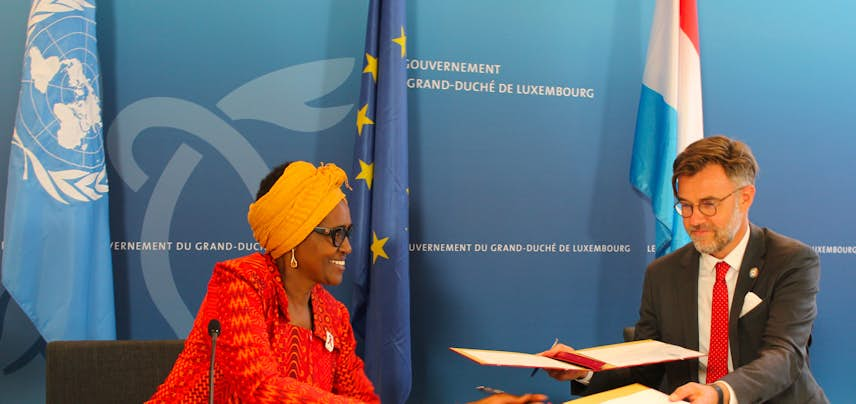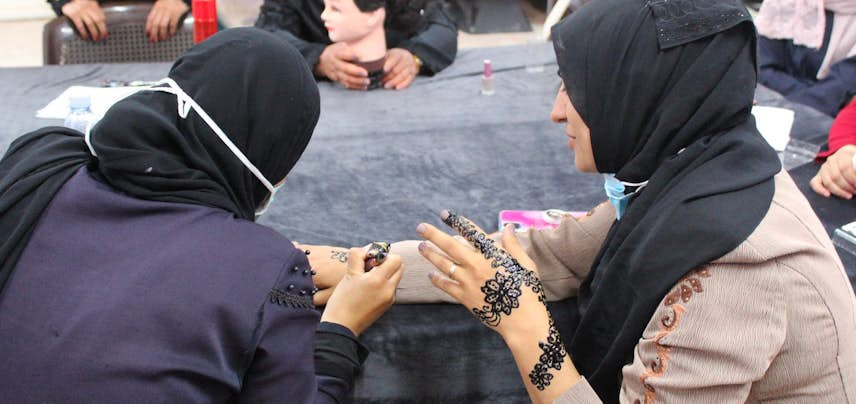Introduction
Luxembourg Development Cooperation earmarks about 30% of the official development assistance budget per year to support the programmes and projects of multilateral organisations in order to contribute to the implementation of the 17 Sustainable Development Goals (SDGs) set out in the United Nations Agenda 2030. Multilateral cooperation is also a mainstay of “On the way to 2030” , Luxembourg Development Cooperation’s general strategy from 2018.
In 2021, progress in implementing the 17 SDGs in 2021 was hampered for the second year in a row by the COVID-19 pandemic. The damage done by the pandemic to access to health care, education and food is considerable, and the need to address it quickly and effectively has been a high priority for multilateral cooperation.
The multilateral cooperation component dedicated to global health accounts for 15% of Luxembourg’s official development assistance. As regards the commitment by multilateral cooperation to combating the COVID-19 pandemic, Luxembourg increased its support for several multilateral initiatives in 2021.
Luxembourg has thus contributed EUR 4 million to the COVAX market commitment financing instrument, enabling 92 low- and middle-income economies to be supplied with donor-funded doses of vaccine. In addition to its financial contribution to the COVAX mechanism, Luxembourg has made its first donations of vaccines under this framework. As of
18 February 2021, Luxembourg had initiated procedures for the donation of more than 600 000 doses of vaccine through the COVAX mechanism, of which 209 850 doses of vaccine were delivered to Egypt, Ghana, Pakistan, Rwanda and Vietnam. Luxembourg has also made a bilateral donation of 56 000 doses of AstraZeneca vaccine to Cabo Verde under the European Union Civil Protection Mechanism.
Luxembourg also contributed EUR 2 million to the C19RM mechanism, which is the COVID-19 response mechanism established by the Global Fund to Fight AIDS, Tuberculosis and Malaria.
The activities under multilateral cooperation have largely been defined by the COVID-19 pandemic, but efforts to combat other endemic diseases, such as AIDS, tuberculosis and malaria, have not been neglected.
Indeed, 2021 marks 40 years since the first reported HIV/AIDS infections and the adoption of a new global strategy that sets the strategic direction to ensure that HIV/AIDS is no longer a threat to public health by 2030. In this context, Luxembourg supports the priority given to access to health care for vulnerable people, particularly women and girls, who are disproportionately affected by HIV/AIDS. For example, at the Generation Equality Forum in July 2021, Luxembourg announced support of EUR 700 000 for the Education Plus initiative. The initiative, launched by UNAIDS in partnership with UNICEF, UNFPA, UN Women and UNESCO, aims to enable girls in sub-Saharan Africa, often not attending school and disproportionately infected with HIV/AIDS, to complete their education.
In July 2021, during the visit by UNAIDS Executive Director Winnie Byanyima, Luxembourg signed a new strategic partnership agreement for the 2022 – 2026 period with UNAIDS, aligned with its new 2021 – 2026 global strategy to combat HIV/AIDS.
In addition, in order to rekindle regional political commitment at the highest level for combating HIV/AIDS in sub-Saharan Africa, which is disproportionately affected by the disease, from 31 October to 2 November Minister Fayot participated in the High-Level Regional Summit for HIV/AIDS in West and Central Africa in Dakar, organised with financial support from Luxembourg.
From January 2020 to December 2021, Luxembourg also chaired the Belgium/Netherlands/Portugal/Luxembourg grouping of the UNAIDS Coordinating Board.
New strategic partnership agreements
- Strategic partnership agreements are non-binding agreements setting out the broad outlines of cooperation between Luxembourg and UN agencies. They are based on strategic exchanges with the UN agencies and align the relevant Luxembourg priorities so that Luxembourg can work with the agencies to implement Agenda 2030 and achieve the corresponding SDGs.
- The new agreements constitute an overhaul of the way in which Luxembourg Development Cooperation operates. The procedures to be followed have been updated and brought into line with the most recent standards (e.g. concerning all protection against sexual exploitation, abuse and harassment). An annual consultation will review common strategies with UN agencies and modify them as required to meet the demands of a constantly changing environment.
- In addition, this will give the UN agencies better visibility of the contributions planned by Luxembourg Development Cooperation for 2022-2025. This will allow the agencies to better plan their activities.
- Finally, Luxembourg Development Cooperation’s strategies in the fields of gender, environment and inclusive and innovative finance have been clearly integrated into the new strategic partnership agreements and will inform the projects/programmes financed by Luxembourg Development Cooperation.
The partnership with the World Health Organization (WHO) has been strengthened through multiple commitments by Luxembourg, which in December 2021 became co-chair of the Polio Partners Group (PPG) of the Global Polio Eradication Initiative (GPEI), and which has since 2020 chaired the Joint Coordinating Board of the Special Programme for Research and Training in Tropical Diseases. Luxembourg Development Cooperation is also supporting ongoing reform work within the WHO to enable it to increase its budget through more compulsory contributions from its member states.
Another long-standing partner of Luxembourg Development Cooperation is the Global Fund to Fight AIDS, Tuberculosis and Malaria, which remains the world’s leading provider of grants for combating AIDS, tuberculosis and malaria in middle- and low-income countries. Luxembourg assumed the role of alternate member of the “Point Seven” constituency on the Global Fund’s Board in July 2021.
In parallel with topics relating to global health, other thematic priorities were addressed in the annual consultations with the New York-based UN agencies in December 2021 (UNICEF, UNFPA, UNDP and UN Women). Discussions focused on the agencies’ new strategic plans and the difficulties agencies have been faced with in the context of the COVID-19 pandemic. At the same time, Luxembourg Development Cooperation took this opportunity to present its new gender, environment and inclusive/innovative finance strategies to the agencies it met with.
In order to ensure that our trusted partners are able to continue their work under predictable conditions, with a sense of security, Luxembourg Development Cooperation has signed several strategic partnership agreements. In this context, Luxembourg participated in the 12th replenishment of the resources of the International Fund for Agricultural Development (IFAD), covering the 2022 – 2024 period. Luxembourg Development Cooperation announced three annual contributions of EUR 1.3 million, totalling EUR 3.9 million. In addition, four new framework agreements (2022 – 2025) were signed with UNDP, UNCDF, UNICEF and UNFPA, with a total budget of EUR 80 550 000. These framework agreements are aligned with the agencies’ strategic priorities as well as with the overall strategy of Luxembourg Development Cooperation.
Since education remains an important priority for Luxembourg Development Cooperation, Minister Fayot participated in the Global Education Summit: Financing GPE 2021 – 2025, at which he announced a multiannual contribution of EUR 2.5 million for the 2021 – 2025 period. The Global Partnership for Education (GPE) is a global fund focused exclusively on transforming education in low-income countries. In view of the importance placed by Luxembourg Development Cooperation on education and technical and vocational training, the GPE’s work is directly aligned with Luxembourg’s priorities in this field. Additionally, Luxembourg has decided to join the School Meals Coalition, whose mission is to rapidly improve the nutrition, health and education of school-age children around the world.

